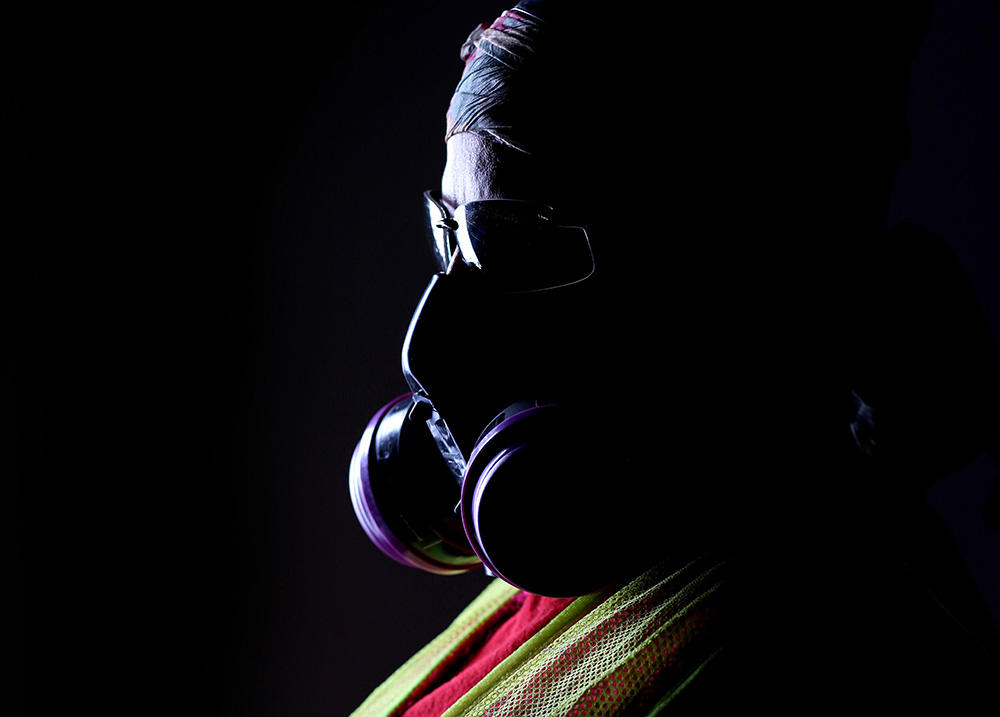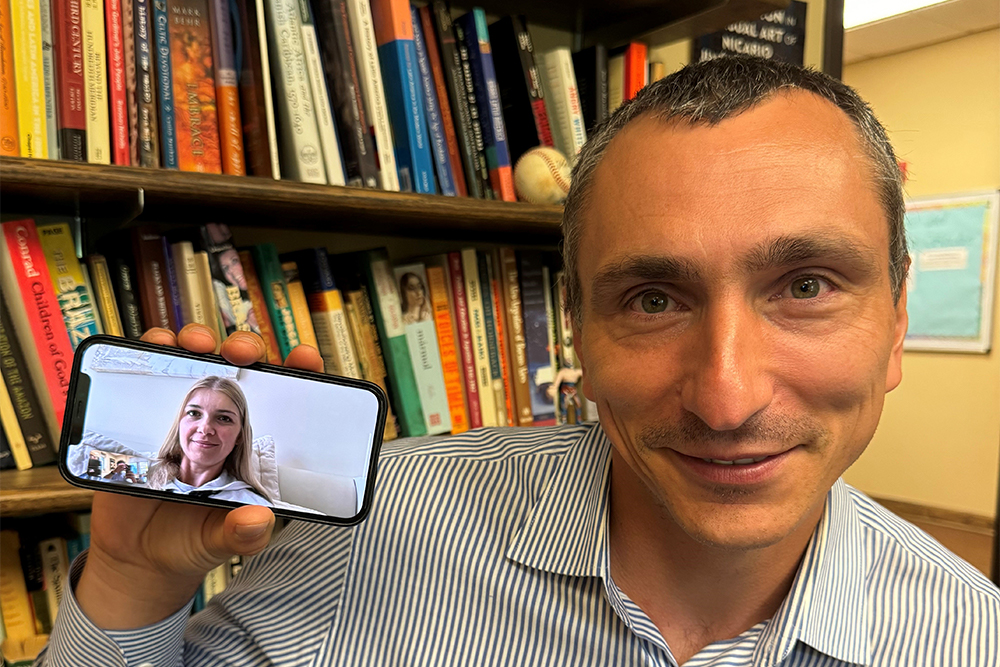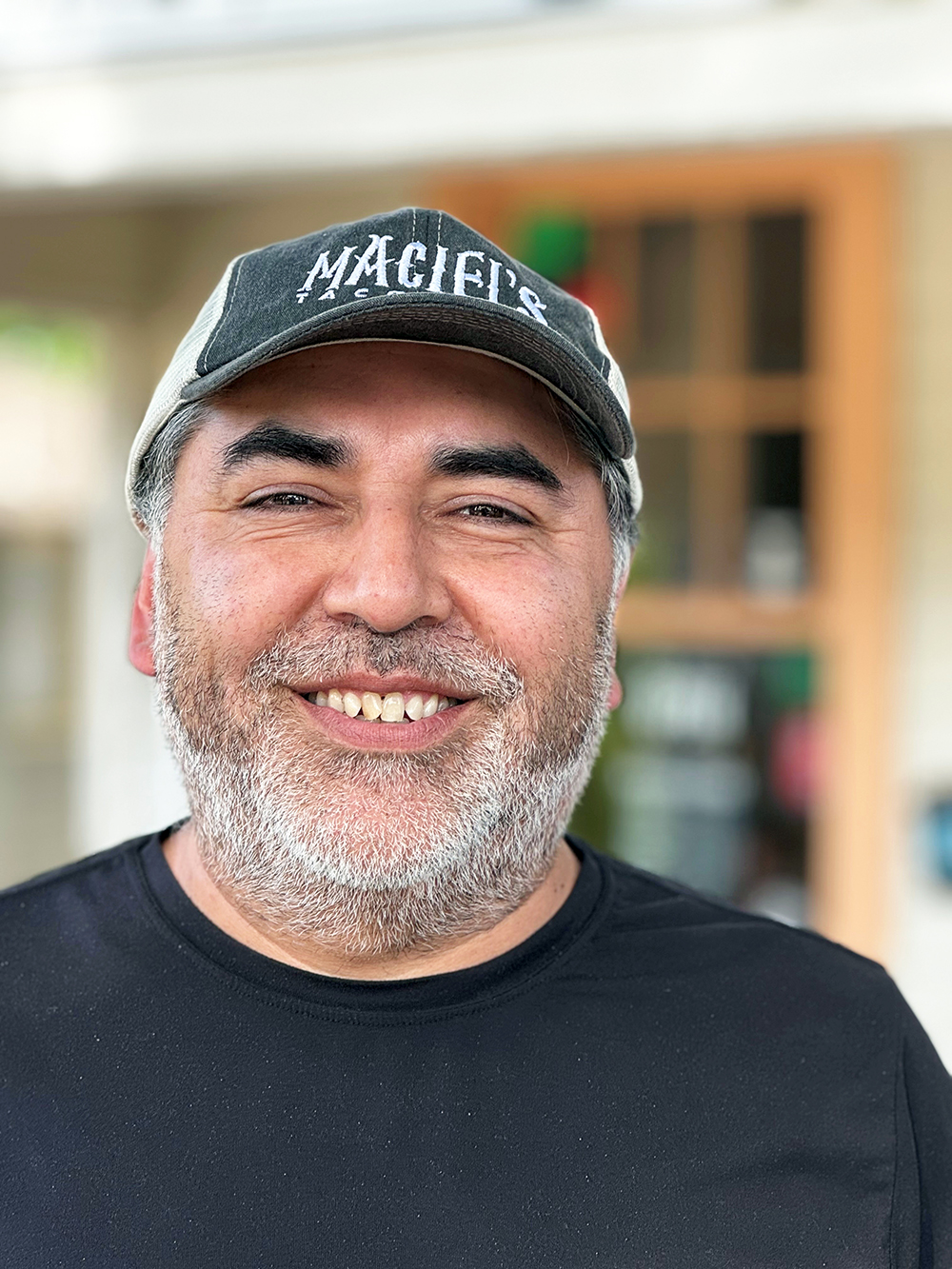Editor’s note: Maria and Jose are not the real names of the two main subjects of this story. As a general practice, the Institute for Public Service Reporting does not use pseudonyms but is doing so in this case because of the sensitive nature of this story, which shines light on the plight of many immigrant families.
Sitting on a metal stool at her breakfast bar, Maria sighs and stares into the distance as she recalls her unlawful entry into the U.S. two decades ago.
“[Where I come from] it is nearly impossible to get a visa for this country,” says the curly haired mother of four who migrated here from Latin America in the early 2000s to escape crushing poverty and the roaming gangs that terrorized her hometown.
Her journey to a middle-class life in Tennessee came at great cost. The day she stuffed her life into a backpack, she said goodbye to her mother, father, and siblings — virtually everything and everyone she had ever known. She left with a tube of toothpaste, a toothbrush, a deodorant stick, and two changes of clothing as well as her ID that she stashed inside her bra for safekeeping.
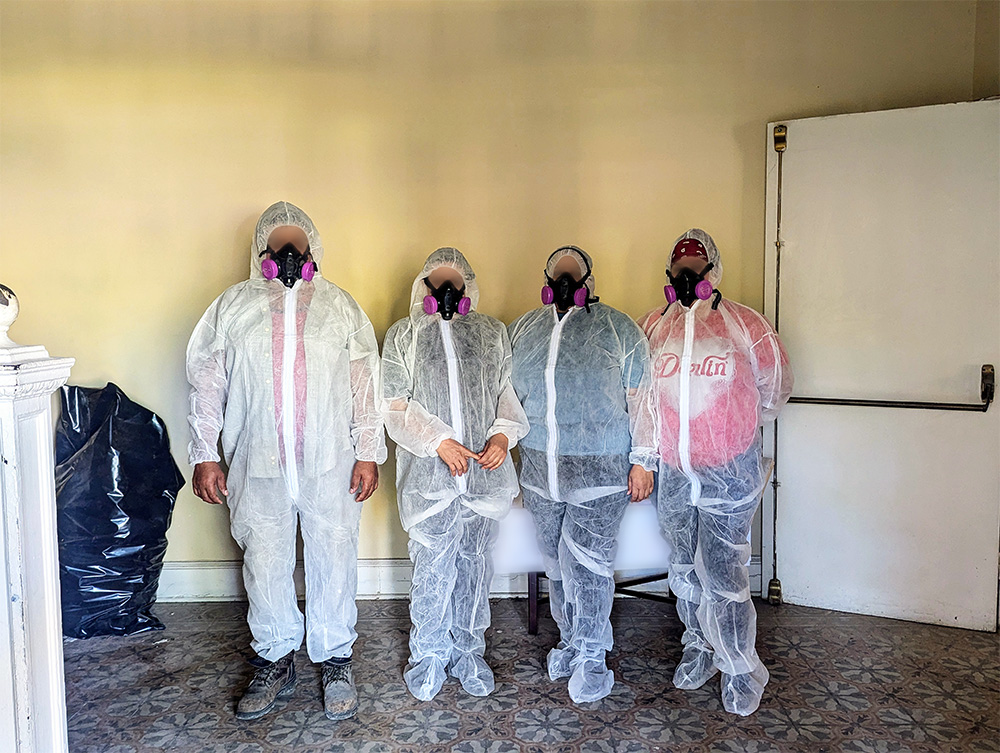
“You don’t know if you will be killed or raped,’’ said Maria, who was a young adult when she hired a team of smugglers to guide her on a treacherous trek across towering mountains, murky rivers, and rugged wastelands. “There is so much uncertainty.”
Following her husband, Jose, who came to the U.S. before her, she’s lived the past decade in Tennessee where she and Jose earn a living laboring with their hands. Together, they’re living an American dream, building a future for their children, three of whom were born and raised in the U.S.
But the family’s sense of security came tumbling down when Jose was arrested on a decades-old immigration violation — a legal dilemma that could result in his deportation. Back in the early 2000s, an attorney had advised Jose to skip an immigration court hearing, he said. It was poor advice — and a clear mistake.
Still, Jose thought he had put the matter far behind him, until recently when police pulled him over for a traffic violation. That’s when his old immigration case popped up in a computer check.
Police alerted federal authorities and Jose then was arrested by U.S. Immigration and Customs Enforcement (ICE) agents and held in custody briefly before being released with a temporary work permit. He now attends routine immigration check-ins. The possibility of deportation — and family separation — is a constant threat hanging over both Jose and Maria.
“I go out, and I don’t know if I will make it back,” Maria said. “You could get caught at work, stopped by police. … You can’t even go out to eat at a restaurant” without fearing being arrested by ICE agents, she explained.
What’s changed for Maria and Jose is a wave of anti-immigrant sentiment that’s spread across Tennessee, intensifying following the election last November of President Donald Trump. Much of that sentiment is built on contentions by Trump and others that the ranks of the U.S.’s estimated 11 million to 14 million undocumented immigrants are overflowing with murderers, rapists, terrorists, and other hardcore criminals — “illegal alien monsters,” Trump called them in his address to Congress in March.
Examples of heinous crimes do exist. Yet repeated studies have shown immigrants are far less likely to commit crimes than the native population. One, a six-year study in Texas, found that “undocumented immigrants are arrested at less than half the rate of native-born U.S. citizens for violent and drug crimes.”
Getting to the truth can be difficult, given the broad secrecy and misinformation surrounding deportation efforts nationally and in Tennessee, according to records reviewed by the Institute for Public Service Reporting and interviews with more than a dozen immigrants, attorneys, law enforcement officials, a college professor, and others who study U.S. immigration policy.
The best evidence suggests that the typical undocumented immigrant more closely resembles Maria and Jose than Jose Antonio Ibarra, the infamous Venezuelan man convicted last year of murdering Georgia nursing student Laken Riley, whose story has become a rallying cry for the mass deportation movement.
“The majority of us come here to work,” Maria said.
“Very loving people”
On a typical weekday Maria rises before the sun, cooks breakfast for her family, then gets ready for the day before driving her teenage daughter to school. By 8:45 a.m. she is dressed for work, ready to begin her day in manual labor.
It’s a tough, busy life, but not nearly as chaotic as the one she knew in her homeland.
“There are two things you can do: join the criminals or join the group of people who are living in hiding and constant fear,” Maria said of her options back home.
Growing up, Maria dreamed of becoming a medical professional. She found only misery and fear.
The best her hardscrabble hometown could offer was the equivalent of 15 U.S. dollars a week mopping floors and cleaning bathrooms. Then there were the heavily armed gangs that roamed the streets, stealing what little people had. One day, a man pointed a cold gun barrel at her back. He stole her watch — a Casio with a black leather wristband and gold-colored bezel — the only piece of jewelry she had ever owned. Incidents like this happened often, she said. Her brother’s house has been burned down twice.
“Completamente inseguro,’’ Maria said in her native Spanish. Completely unsafe.
“You go out to work and could get robbed. You could be home and get robbed,” she said.
The Institute for Public Service Reporting was not able to independently verify Maria’s account, but it is consistent with news reports and studies of the region of Latin America from where she and Jose are from.
Nothing has come easy for the couple, not even here in their adopted country.
Over the past two decades in the U.S., Maria has worked many jobs: as a nanny, a cook, a factory worker, and a laborer, all while juggling her responsibilities as a wife and mother working to make ends meet.
She is one of the estimated 13.7 million people living in the country without authorization. She and her husband Jose pay taxes but receive no government benefits such as Social Security or Medicaid.
“They believe in the Bible and what it teaches,” said their pastor, a lifelong Tennessean. “I’ve never had a problem with them as far as their honesty and the way they deal with people. They’re very loving people. … They love to serve and so they are very involved in the ministries.”
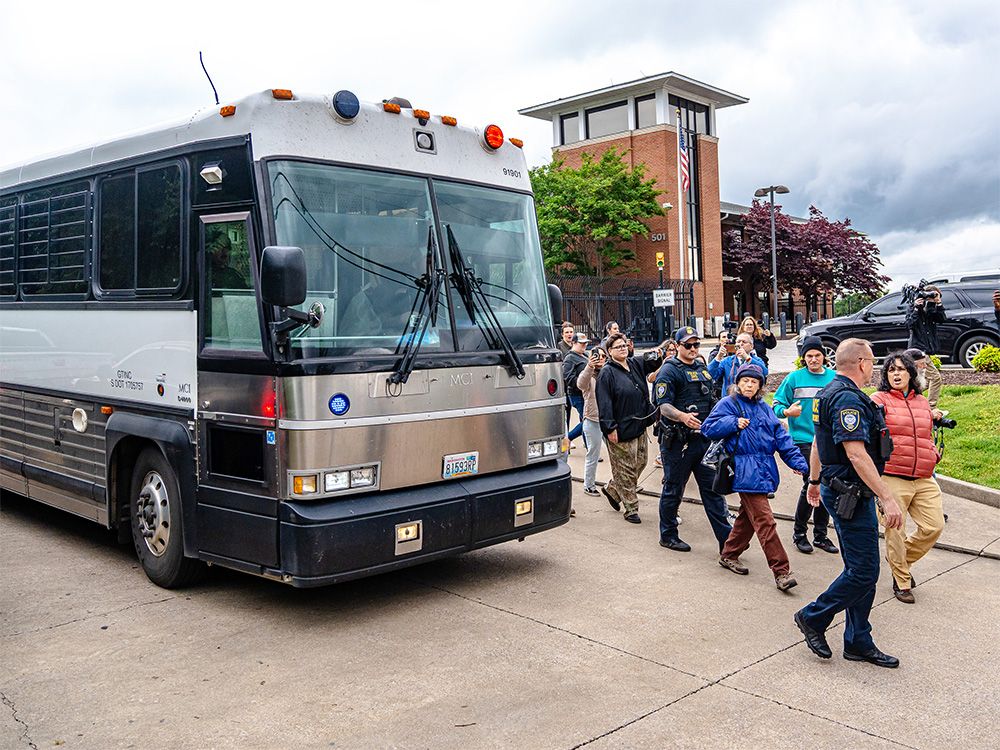
Crackdown on illegal immigration
Stories of unauthorized immigrants like Jose and Maria can’t be found on ICE’s news releases web page. The site serves as a virtual rogue’s gallery of nefarious characters, seeming to reinforce the nation’s worst fears of an immigrant crime wave. ICE arrested a Guatemalan child sex offender on March 7th in New York, the site says. It removed a Romanian fraudster a day earlier in New Jersey. The agency has taken down a Mexican fugitive wanted for kidnapping, an El Salvadoran child rapist, a Chinese sex trafficker, a Colombian child molester who once served as a priest, and scores of others since Trump took office in January.
Trump’s “border czar,’’ Tom Homan, told reporters last month the crackdown has achieved “unprecedented success.’’ The White House reported then that about 139,000 people had been deported since Trump took office in January. Though deportation numbers at times fell short of numbers under former President Joe Biden, the Trump administration says the comparison is not fair. That’s because illegal border crossings have fallen precipitously. The federal government reported in March that 7,181 people were apprehended nationwide during border crossings, a 95 percent decrease from March 2024, according to the Associated Press.
“We’re going to keep doing it, full speed ahead,” Homan said of the crackdown.
In his address to Congress, Trump recited the story of Laken Riley, a 22-year-old Georgia nursing student who was abducted and murdered last year by an undocumented immigrant from Venezuela who had been previously arrested on a theft charge. Her murder stirred a national debate over border security, leading Congress in January to pass the Laken Riley Act, which allows ICE to detain unauthorized immigrants accused but not necessarily convicted of theft-related crimes.
Immigrant advocates like Matthew Orr say the Laken Riley law has helped create an atmosphere of zero tolerance in which Hispanic- or foreign-looking people are racially profiled.
“What is to prevent local, state, and/or federal authorities from levying a completely false shoplifting charge against an immigrant, for the sole purpose of detaining them?” asks Orr, managing attorney for Latino Memphis, a nonprofit that advocates for Hispanic residents seeking healthcare, education, and justice.
Already, numbers of people with no criminal record or with records of petty offenses are being swept up in the mass deportation efforts, immigration advocates say.
In February, the Department of Homeland Security sent more than 170 Venezuelan nationals to Guantanamo Bay; National Public Radio (NPR) reported that about a third of them had no criminal record.
In March, after the Trump administration invoked the Alien Enemies Act, more than 250 undocumented immigrants were rounded up without hearings and flown to a maximum-security prison in El Salvador on suspicion of belonging to the Venezuelan gang Tren de Aragua. The administration has conceded that many do not have criminal records, The Washington Post reported. Many of the deportees, among them a Venezuelan soccer player, continue to claim they are not gang members. CBS News reported that “an overwhelming majority have no apparent criminal convictions or even criminal charges.”
Earlier this spring, the administration also began arresting international students who are in the country legally and without criminal records. Several of them have been linked to pro-Palestinian protests. The federal government has accused some of them of being “pro-Hamas” and acting in “erratic behavior,” prompting more allegations of unjust treatment.
Latino Memphis’ Orr warns that the erosion of the right to due process could have dire consequences for immigrants and citizens alike. “Due process protections are not a privilege for criminals but a safeguard for the innocent. This is not a political issue,” he said.
Secrecy and missteps in Tennessee
Tennessee is attempting to gauge the impact of crime by undocumented immigrants under a law passed last year by the General Assembly. It requires local law enforcement to report the number of people living here without authorization who’ve been charged with or convicted of crimes.
In its first report under the law, the Tennessee District Attorneys General Conference in January released its 2024 Immigration Report. The report captured data only from the last quarter of 2024. During that three-month period, there were 2,719 reports of crimes committed by individuals unlawfully present statewide, the report said.
Overall, the report listed 3,854 charges (some defendants had multiple charges), including 447 violent offenses. Those violent offenses included 11 homicide charges, six counts of aggravated rape, and three others involving rape of a child.
But the report is deficient on several counts, said Meghan Conley, assistant professor of practice in the Department of Sociology at the University of Tennessee, Knoxville.
For one, the report fails to separate criminal convictions from mere allegations, Conley said.
The report also fails to provide overall state crime numbers needed to assess the share of crime committed by undocumented immigrants. But numbers obtained from other sources suggest the percent of crime committed by undocumented immigrants is low.
For example, the Immigration Report cited 59 reports of criminal acts by undocumented immigrants in Shelby County for the last quarter of 2024. Over the course of a year, that total would reach 236 criminal acts. That represents about 1.7 percent of the approximately 14,000 criminal incidents reported in Shelby County last year by the Memphis Shelby Crime Commission.
One would expect that share to be larger based on population numbers. According to the Migration Policy Institute there are about 26,000 unauthorized persons living in Shelby County. That represents about 2.9 percent of the county’s population of 910,530.
Conley sees additional problems with the report including a flawed data collection system.
“Law enforcement officers do not have training to understand the complexity of immigration law and immigration status,” Conley said.
Shelby County District Attorney Steve Mulroy agreed, saying the data might be unreliable for reasons that include lack of training.
His theory proved difficult to test, however. Neither the Memphis Police Department nor the Sheriff’s Office responded to inquiries about the training that officers received to collect this data.
Digging deeper, the Institute requested the raw data that the District Attorneys General Conference received from local law enforcement agencies, but the request was denied. The report comes as Tennessee also is developing a state immigration division to assist in President Trump’s mass deportation initiative. By law, many records in that office are exempt from disclosure.
Mulroy said drug trafficking passing through Shelby County does have a distinct foreign-born element, and that is an issue of concern. But he adds that “exaggerated fear and loathing of undocumented people” and “migrant crime” are unwarranted: “Based on my experience, I have no reason to think they commit any more crime than documented people or native-born people,” Mulroy said.
In a joint investigation in 2019, the Marshall Project and The New York Times found little correlation between changes in crime rates and changes in estimated undocumented immigrant populations in 161 cities around the country — including Memphis, Nashville, Chattanooga, and Knoxville — between 2007 and 2016.
“There’s no connection at all that we could see between any type of crime and the undocumented immigration,” said Anna Flagg, senior data reporter at the Marshall Project.
Crime rates remained the same in metro areas regardless of whether the population of undocumented immigrants increased or decreased, Flagg said.
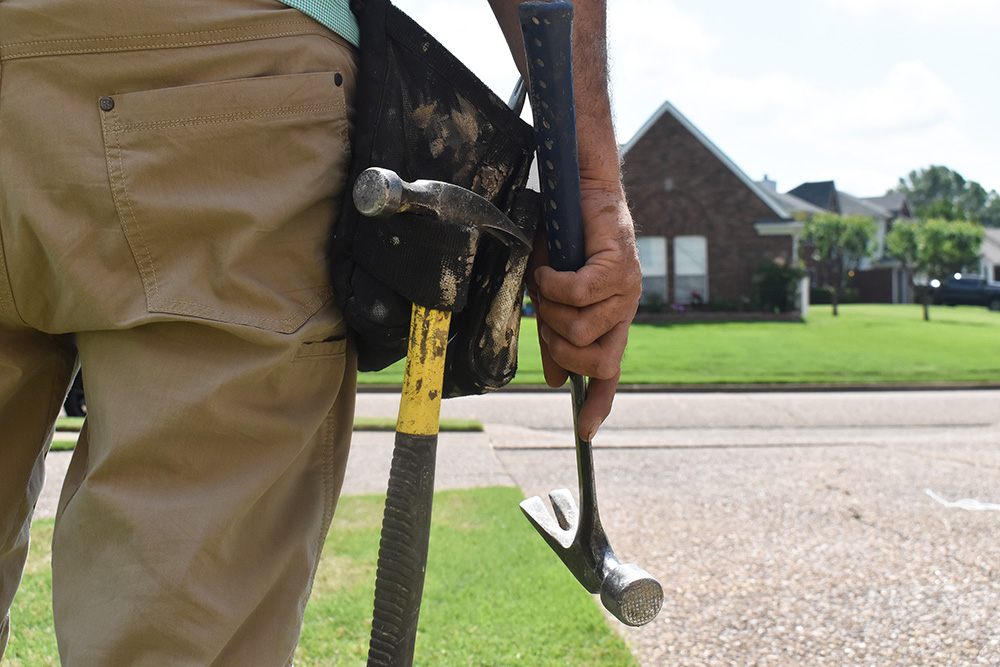
Jose is arrested
The crackdown on illegal immigration has hit close to home for Maria and Jose.
Their troubles started when Jose was pulled over by police due to an equipment failure on his car.
As Jose tells it, an officer told him that ICE had a warrant for his arrest. It was issued years ago by an immigration judge after Jose failed to show up for a court hearing. In his absence, the judge issued an order to remove him from the country. In an interview, Jose said he didn’t go to the hearing for fear of being deported and due to bad legal advice. During the recent traffic stop, an officer told him to expect a call from a detective.
“I gave her my phone number, and when I heard that, I knew the police would not call,” he said. “Immigration is going to show up at my house.”
Weeks later, ICE Enforcement and Removal Operations officers knocked on his door, he said.
In another twist, officials who reviewed his record decided to release him on his own recognizance and provided him with a work permit, he said. Records held by ICE were unavailable.
In the wake of the traffic stop and the decision to allow him to remain in the U.S. at least temporarily, Jose was overcome with emotion.
“I cried like a baby,” he said.
Given the intensity of the current crackdown on illegal immigration, however, Jose may still face an uphill battle to remain in the U.S.
An undocumented immigrant who is under supervision following an order of removal “can be removed at any time in ICE’s discretion,” said Memphis immigration attorney Sally M. Joyner. An immigrant’s options for remaining in the country include proving that he or she failed to receive notice of a removal hearing, establishing a reasonable fear of persecution or torture if deported, or requesting humanitarian status, Joyner said.
Jose said if he’s ordered to be removed he will appeal his case even though he doesn’t have an immigration lawyer and says he can’t afford one.
“Every day I pray to God to give me the opportunity to stay here with my kids,” he said.
Violation of immigration laws
Contrary to popular opinion, living in the U.S. without permission isn’t necessarily a crime. It’s a civil violation, according to immigration attorney Orr.
On the other hand, entering the country without express authorization is a crime. Avoiding examination or inspection by the federal government violates 8 U.S. Code § 1325, and is a misdemeanor punishable by a fine or up to six months in jail.
By some estimates, nearly half the U.S.’s undocumented population entered the country legally as students, professionals, or workers who then overstayed their visas. Those infractions are violations of civil law, not criminal law.
Orr likens overstaying a visa to a publicly traded corporation violating the Securities and Exchange Commission’s civil rules and regulations. He finds it infuriating that many unlawfully present immigrants are portrayed as dangerous criminals.
“The idea is to place all of the ills of society at the feet of the immigrant and to convince the general public that immigrants are your enemy. They’re taking your jobs; they’re criminals; they’re dangerous,” he said.
The criminal migrant rhetoric is proving effective. A February poll conducted by NPR concluded that people who get their news from conservative news outlets are more likely to believe false statements about immigrant communities, including that large numbers of migrants coming into the U.S. have been released from jails or mental institutions and that immigrants are more likely to commit crimes than the U.S.-born population.
Maria and Jose’s pastor said that lack of knowledge is troubling.
“If most people knew the lengths that people went to be here and contribute, I think they would have a little different attitude,” he said.
“The majority of the people that have come here and they’re undocumented that I have known have been very decent people, hardworking people, loving people,” he said. “I would not have any idea what the percentage is, but to be violent criminals, I would say it would be a very small percentage, and I wouldn’t think it would be any higher probably than any other group of people that’s here.
“I think most of them want to be here to stay; they want to raise a family; they want it to be a safe environment; they want it to be a stable economy because it’s their future.”
Meanwhile, Maria and Jose live with the knowledge that anything can change at any given moment. Maria said her family gathers strength from the moments they spend with each other, their interactions with friends, and through their daily prayers.
“I’m here because of God’s greatness,” said Maria.
“Everything is in God’s hands.”
The Institute of Public Service Reporting’s Marc Perrusquia contributed to this article.
